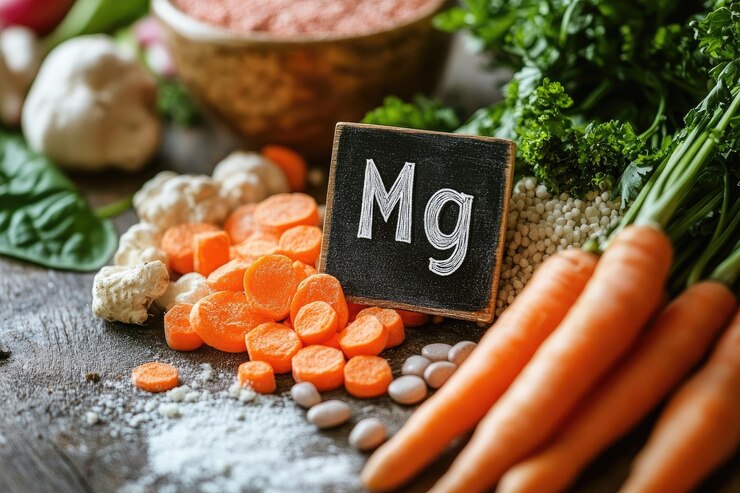Magnesium + Magnesium Nitrate: A Comprehensive Guide to Their Uses, Benefits, and Applications
Magnesium is one of the most essential elements in the human body and the environment. Its importance spans health, industrial applications, and agriculture. When combined with magnesium nitrate, it forms a powerful compound that serves various purposes, especially in agriculture as a fertilizer. In this comprehensive guide, we will explore the properties of magnesium and magnesium nitrate, their health benefits, industrial uses, and their vital role in plant nutrition.
What is Magnesium?
Magnesium (Mg) is a naturally occurring element that is essential for many biological functions. It is an alkaline earth metal with an atomic number of 12 and is the eighth most abundant element on Earth. In its elemental form, magnesium is a silvery-white metal, but it is more commonly found in compounds, especially magnesium salts, in both marine and terrestrial environments.
Health Benefits of Magnesium
Magnesium is vital for human health, as it plays a critical role in over 300 enzymatic reactions, including protein synthesis, muscle and nerve function, blood glucose control, and blood pressure regulation. Below are some of the key benefits of magnesium:
- Bone Health: Magnesium helps in the absorption of calcium, promoting healthy bones and reducing the risk of osteoporosis.
- Heart Health: It helps in maintaining a healthy heart rhythm and supports proper blood circulation, reducing the risk of cardiovascular diseases.
- Mental Health: Magnesium plays a role in brain function and mood regulation. Low magnesium levels are linked to conditions like depression and anxiety.
- Muscle Function: It helps prevent muscle cramps and spasms by aiding in muscle relaxation.
- Energy Production: Magnesium is involved in ATP (adenosine triphosphate) production, the energy currency of the cells.
Magnesium in Agriculture
In agriculture, magnesium is essential for plant growth as it is a central atom in chlorophyll, the molecule responsible for photosynthesis. Without sufficient magnesium, plants cannot efficiently carry out this process, leading to poor growth and yield.
Magnesium Deficiency in Plants
Magnesium deficiency in plants can lead to several issues:
- Interveinal Chlorosis: Yellowing of leaves while veins remain green.
- Reduced Growth: Magnesium is crucial for photosynthesis, and its deficiency can stunt plant growth.
- Low Yield: Plants with magnesium deficiency produce lower yields and poor-quality crops.
What is Magnesium Nitrate?
Magnesium nitrate is a compound composed of magnesium, nitrogen, and oxygen with the chemical formula Mg(NO₃)₂. It is a highly soluble substance, often used in agriculture as a fertilizer due to its nutrient-rich properties. Magnesium nitrate provides both magnesium and nitrogen, two critical nutrients for plant development.
Properties of Magnesium Nitrate
- Solubility: Magnesium nitrate is highly soluble in water, making it an excellent choice for fertigation systems in agriculture.
- Crystalline Structure: It appears as a white crystalline solid at room temperature.
- Non-Combustible: While it is non-combustible, it can intensify the combustion of other materials due to its oxidizing properties.
Magnesium Nitrate in Agriculture
Magnesium nitrat’e is primarily used in agriculture as a fertilizer because it delivers both magnesium and nitrogen, two essential nutrients that are crucial for plant growth. Farmers commonly use it to prevent and treat magnesium deficiency in crops.
Importance of Magnesium Nitrate Fertilizers
- Dual Nutrient Supply: Magnesium nitrat’e provides two essential nutrients—magnesium and nitrogen—in a readily available form for plants.
- Prevention of Deficiencies: Crops like tomatoes, potatoes, and various fruit trees often face magnesium deficiencies, which can be corrected by magnesium nitrate.
- Boosts Photosynthesis: Magnesium is central to chlorophyll production, and nitrate provides the nitrogen required for protein synthesis and growth.
- Improves Soil Health: Magnesium nitrat’e fertilizers can improve soil structure and fertility, promoting sustainable farming practices.
How Magnesium and Magnesium Nitrate Work Together in Plant Nutrition
When used together, magnesium and magnesium nitrate create a synergistic effect, promoting better crop health and higher yields. Magnesium helps with chlorophyll production, while nitrate provides the nitrogen necessary for plant metabolism and protein synthesis.
Benefits for Plants
- Enhanced Chlorophyll Production: Chlorophyll is the green pigment that enables plants to absorb light energy, and magnesium is at the core of this molecule.
- Improved Nitrogen Uptake: The nitrate in magnesium nitrat’e fertilizers improves nitrogen absorption, leading to robust plant growth.
- Prevention of Stress: Plants treated with magnesium nitrat’e are more resilient to environmental stressors like drought and disease.
Industrial Uses of Magnesium and Magnesium Nitrate
While magnesium and magnesium nitrat’e are best known for their roles in agriculture, they also have a wide range of industrial applications.
Magnesium in Industry
- Aerospace: Magnesium alloys are lightweight and strong, making them ideal for use in aircraft and spacecraft components.
- Automotive: Magnesium is used to manufacture lightweight car parts, improving fuel efficiency.
- Electronics: Magnesium’s conductivity makes it useful in producing electronic devices like smartphones and laptops.
Magnesium Nitrate in Industry
- Oxidizing Agent: Magnesium nitrat’e is used as an oxidizing agent in pyrotechnics and explosives.
- Dehydrating Agent: It is employed as a desiccant to remove moisture from air and other gases.
- Chemical Synthesis: Magnesium nitrat’e is a precursor in the production of other magnesium compounds.
Environmental Impacts of Magnesium and Magnesium Nitrate
The use of magnesium and magnesium nitrate can have both positive and negative impacts on the environment.
Positive Impacts
- Sustainable Agriculture: Magnesium nitrat’e promotes healthy plant growth, improving crop yields and soil health, which can contribute to more sustainable farming practices.
- Carbon Sequestration: Healthy plants absorb more carbon dioxide from the atmosphere, helping to mitigate climate change.
Potential Negative Impacts
- Overuse of Fertilizers: Excessive use of magnesium nitrat’e fertilizers can lead to nutrient runoff, which may cause water pollution and eutrophication in nearby bodies of water.
- Soil Imbalance: Overapplication can disturb the balance of nutrients in the soil, leading to long-term soil degradation.
The Role of Magnesium and Magnesium Nitrate in Water Treatment
Both magnesium and magnesium nitrat’e are used in water treatment processes, though for different purposes.
Magnesium in Water Treatment
Magnesium hydroxide is commonly used to treat wastewater because it neutralizes acids, balances pH levels, and precipitates heavy metals. It is also a key component in the treatment of drinking water to make it safe for consumption.
Magnesium Nitrat’e in Water Treatment
Magnesium nitrate is used as a source of nitrat’e in the biological treatment of wastewater. It helps support denitrification, a process where nitrate is converted into nitrogen gas, reducing the levels of harmful nitrates in the water.
Safety and Handling of Magnesium and Magnesium Nitrate
While both magnesium and magnesium nitrat’e have many beneficial uses, they also need to be handled with care, particularly in industrial settings.
Magnesium Safety Precautions
- Flammability: Magnesium metal is highly flammable, especially in powdered form, and should be kept away from open flames.
- Respiratory Hazards: Inhalation of magnesium dust can cause respiratory issues; therefore, protective masks should be worn when handling magnesium powder.
Magnesium Nitrate Safety Precautions
- Oxidizing Agent: Magnesium nitrat’e is a strong oxidizer, meaning it can intensify fires if it comes into contact with combustible materials.
- Storage: It should be stored in a cool, dry place away from flammable materials.
How to Apply Magnesium Nitrate in Agriculture
The correct application of magnesium nitrat’e in agriculture is crucial to maximize its benefits and minimize any environmental impacts.
Application Methods
- Foliar Spray: Magnesium nitrat’e can be applied as a foliar spray to deliver nutrients directly to the leaves, which is particularly useful for crops suffering from magnesium deficiency.
- Soil Application: It can also be applied directly to the soil, either through irrigation systems or by incorporating it into the soil during planting.
Recommended Dosage
The appropriate dosage of magnesium nitrat’e depends on the type of crop, soil conditions, and the severity of any nutrient deficiencies. It is essential to conduct soil tests and consult with an agronomist to determine the right amount to apply.
Conclusion
Magnesium and magnesium nitrat’e are two essential compounds that play a vital role in various fields, including health, agriculture, industry, and environmental management. Magnesium supports critical functions in the human body and is a key nutrient for plant growth. When combined with nitrate, it becomes an effective fertilizer that boosts crop yields and improves soil health. However, responsible use is necessary to prevent environmental damage, such as nutrient runoff and soil degradation.
As industries continue to discover more uses for magnesium and magnesium nitrat’e, their significance in improving agricultural efficiency, advancing technology, and promoting environmental sustainability will only grow. Understanding how to leverage these compounds effectively will be crucial for meeting the challenges of a growing global population and the need for more sustainable farming practices.
FAQs
What is the main difference between magnesium and magnesium nitrat’e?
Magnesium is a naturally occurring element essential for many biological functions, while magnesium nitrate is a compound that provides both magnesium and nitrogen. Magnesium nitrate is primarily used as a fertilizer in agriculture.
How does magnesium nitrate benefit plants?
Magnesium nitrat’e provides two essential nutrients, magnesium and nitrogen, that are crucial for plant growth. It promotes chlorophyll production and helps prevent magnesium and nitrogen deficiencies in crops.
What are the health benefits of magnesium?
Magnesium plays a vital role in various bodily functions, including muscle and nerve function, blood sugar regulation, and maintaining healthy bones. It also supports heart health, reduces muscle cramps, and improves energy production at the cellular level.
Why is magnesium important for plants?
Magnesium is crucial for plants as it is the central atom in chlorophyll, which is essential for photosynthesis. Without sufficient magnesium, plants cannot produce food efficiently, leading to stunted growth and poor yields.
Can magnesium be used in water treatment?
Yes, magnesium compounds like magnesium hydroxide are used in water treatment to neutralize acids, balance pH levels, and remove heavy metals. Magnesium nitrate is also used in wastewater treatment to support denitrification, a process that reduces harmful nitrate levels in water.







